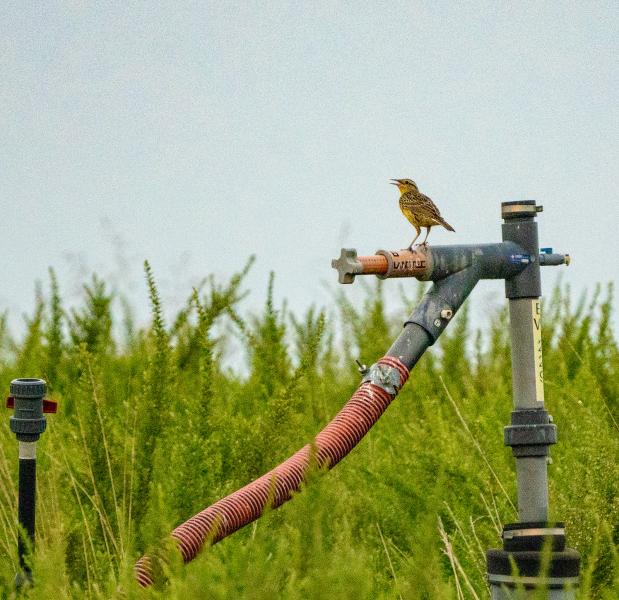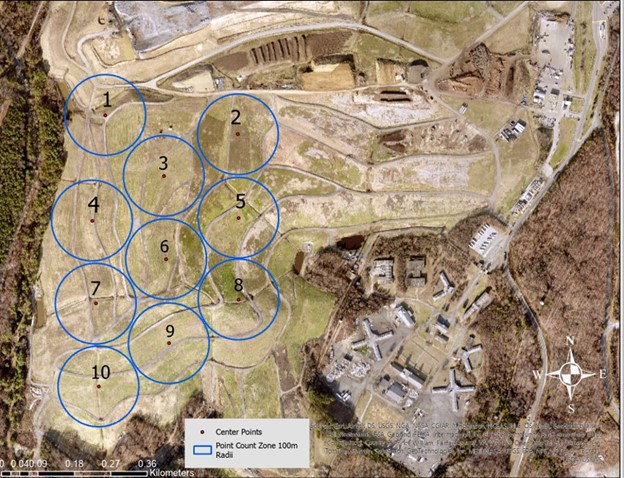Written By Kimberly Lewis, Department of Public Works and Environmental Services (DWPES)
In an inspiring turn of events for avian enthusiasts and conservationists alike, Fairfax County has modified its mowing procedures at the I-95 Landfill Complex in Lorton to protect endangered grassland birds. The Eastern meadowlark and grasshopper sparrow, among other species, are thriving on a 50-acre meadowland atop the landfill, thanks to these new land management practices.

County-Led Study Leads to New Mowing Procedures
Prompted by a three-month study conducted last fall, the Department of Public Works and Environmental Services (DPWES) has adjusted its mowing schedule to better accommodate the nesting habits of these vulnerable birds. The study, which meticulously documented the species and quantities of birds present, highlighted the need for such measures.
Concerns raised by local bird advocates about the protection of grassland birds at the landfill caught the attention of the Board of Supervisors, leading to the commissioning of the study. For more details, see the Board meeting summary, page 23.
"Local birdwatchers have long-known that the I-95 landfill is about the only place you’ll see an Eastern meadowlark in Fairfax County," remarked Blair Evancho, a DPWES grassland habitat intern who led the 2024 study. Evancho explained that grassland birds nest, lay eggs, and raise their young on the ground during the peak nesting season from May through July.
"The modified mowing procedures – which include restricted mowing during peak nesting season and raising mower blades to an eight-inch height – should give grassland birds a better chance to thrive," Evancho added.
Birds of a Feather: DPWES-Led Study Findings
During the study period, 39 bird species were documented at the I-95 landfill, with 29 species identified within 10 specific study zones. Among these were three species of regional concern: the Eastern meadowlark, the bobolink, and the grasshopper sparrow. Notably, the presence of American kestrels, a small grassland falcon, was also significant.
Evancho, alongside DPWES colleague Carlos Leiva, conducted the study from August to October 2024, visiting observation sites at sunrise when birds are most active.
"Two observers at each site provided a 360-degree view," Evancho explained. They meticulously documented bird species sightings and calls, as well as environmental conditions like temperature and wind speed.
For a comprehensive look at the study, see the DPWES’s I-95 Landfill bird report.
Grassland Bird Decline: A National Concern
Among all bird species, grassland birds are facing the steepest population decline nationally, primarily due to habitat loss from urban development that’s taking away the open meadowlands where they live. DPWES plans to continue studying the landfill's avian population to monitor long-term trends.
About the I-95 Landfill
The closed-and-capped section of the I-95 Landfill, which has not accepted municipal waste since 1995, provides an ideal habitat for grassland birds. The hilltop's un-mowed grass, bushes, and other vegetation offer food and water sources that support a diverse bird population. While mowing is necessary for landfill maintenance and regulatory compliance, the new procedures will balance these needs with wildlife conservation.
"Fairfax County has long been a leader in environmental sustainability," said Eric Forbes, DPWES deputy director overseeing the Solid Waste Management Program. "Our ongoing study of grassland birds at the I-95 landfill, in collaboration with local and national bird advocacy organizations, will not only advance bird conservation science but also position Fairfax County as a national leader in sustainable landfill management practices."
Learn more about the Green Vibes at I-95
- Watch: DPWES YouTube video of a bird survey and mowing at I-95 Landfill Complex
- Listen: Fairfax County EnviroPod Episode 52 features bird study Lead Blair Evancho
- Read:
- Fairfax County’s Solid Waste Management Program’s I-95 Landfill Complex web page. Look for information about the bird study as part of DPWES’ new branded series, The Green Vibe at I-95
- Fairfax County Park Authority Birdwatching web page*
*To ensure safety of staff, visitors and wildlife, public access to the I-95 Landfill is restricted.

Kimberly J. Lewis works in the Communications and Media Group of Fairfax County’s Department of Public Works and Environmental Services. With a 30-year career spanning healthcare, engineering, technology, and higher education, she joined DPWES in 2024 after serving as communications director at the University of Central Florida’s College of Engineering and Computer Science. She is a Fairfax County native and George Mason University graduate.
Climate Matters is the blog of Fairfax County’s Office of Environmental and Energy Coordination, where we share stories, insights and information related to climate change and environmental sustainability. Posts are written by knowledgeable and passionate OEEC staff members and guest authors. To read all blog posts, visit Climate Matters.

